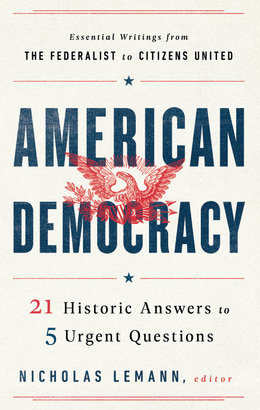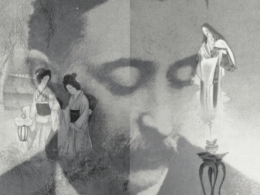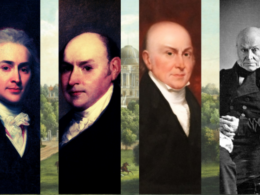Published by Library of America last fall, American Democracy: 21 Historic Answers to 5 Urgent Questions offers a selection of key writings on five crucial issues facing the United States, its system of governing, and its key institutions in the twenty-first century—and the “urgency” signaled in the book’s subtitle has only become more pronounced in the weeks since it first arrived.
Edited by journalist and historian Nicholas Lemann, American Democracy presents classic statements by George Washington and Frederick Douglass alongside arguably less familiar pieces by Jane Addams and Randolph S. Bourne for guidance and inspiration in our fraught moment. (An excerpt from Lemann’s introduction is available here.)
Lemann is Joseph Pulitzer II and Edith Pulitzer Moore Professor and Dean Emeritus of the Graduate School of Journalism at Columbia University and the author, most recently, of Transaction Man: The Rise of the Deal and the Decline of the American Dream (2019). He has been a writer and editor at Washington Monthly, Texas Monthly, and The Washington Post, a national correspondent for The Atlantic, and, since 1999, a staff writer for The New Yorker. Via email, he answered our questions about the anthology.
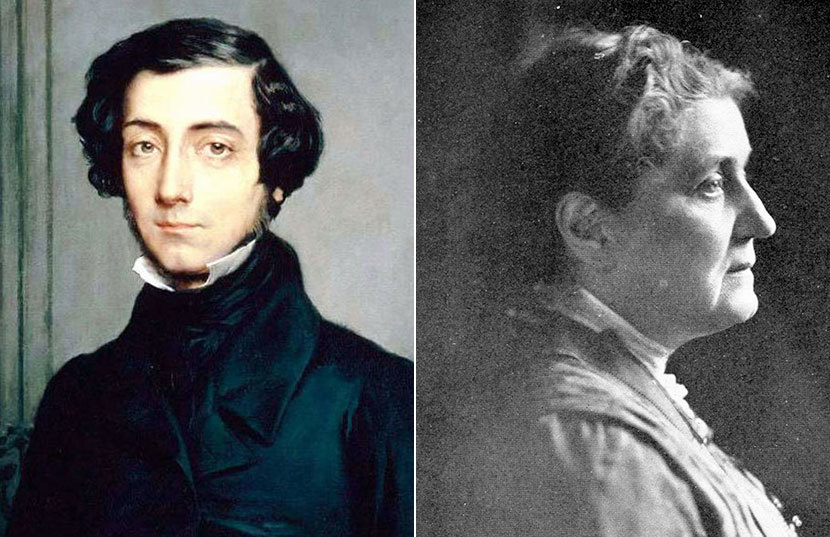
Library of America: Much of the current discussion surrounding democracy is intensely focused on the present and the recent past. American Democracy: 21 Historic Answers to 5 Urgent Questions brings together twenty-one key writings from the late eighteenth to early twenty-first centuries. How did you choose them? What do you hope readers will learn about the present and future of our democracy by reading writing from the past?
Nicholas Lemann: This is not meant to be simply a collection of canonical American texts. The selection and the framing of the book are meant to address important questions in the present. I would like readers to understand that democracy as we understand it did not exist in the United States from the very beginning. It developed, through ceaseless argument, conflict, and activity. That means it shouldn’t be taken for granted, but also that our current set of challenges to democracy should not be the occasion for despair. Such challenges, in some form, are ever-present.
LOA: In the introduction you write: “Democracy is a system. Because the word carries such a positive charge, people naturally assume that when, by their lights, the good guys are winning, it must mean that American democracy is in a healthy state. That is a temptation to be avoided: it mistakes an outcome for a process.” Are there selections in the book that are especially helpful in understanding the process of American democracy?
Lemann: For this I would recommend James Madison’s Federalist No. 51, which argues for the importance of a balance of powers in the federal government, and Justice John Paul Stevens’s dissent in the Citizens United case, which makes it clear how central campaign finance law is to the health of our democracy. These are chronologically the first and last selections in the book.
LOA: The 2020 election was in many respects a hopeful moment for American democracy. During the worst public health crisis in a century, the proportion of eligible voters who cast ballots (66.7 per cent) was the highest since 1900. Unlike the elections of 1876 and 2000, there was no uncertainty about who won the presidential contest. Yet the outcome has been rejected by millions of citizens and many leaders of a major political party, leading to an unprecedented insurrectionary assault on the Capitol. Are there selections in the collection that help make sense of this paradox?
Lemann: The expectation that citizens can be expected to behave rationally, calmly, and on the basis of the truth is relatively new. Fear of irrational popular sentiment is a constant in political philosophy, going back to the Greeks. A good place to find it in this collection might be the selection from Alexis de Tocqueville’s Democracy in America.
LOA: You also write that “nearly all the essential aspects of our democracy have been in dispute from the very beginning.” One of these aspects has been the recurring question of who should be included, or excluded, from “We the People”—who should be a citizen, who should have the right to vote, who should be counted as an American. At a time when the nation is deeply divided regarding basic questions of legitimacy and loyalty, what can the writings in the collection offer in terms of insight and perspective?
Lemann: The speech by Henry Cabot Lodge, from 1896, is a good place to get a taste of the highly limited sense of citizenship that many American leaders have had. Frederick Douglass’s celebrated Fourth of July speech, from 1852, is an example of how the country’s highly restrictive founding documents can be read expansively in service of expanding citizenship.
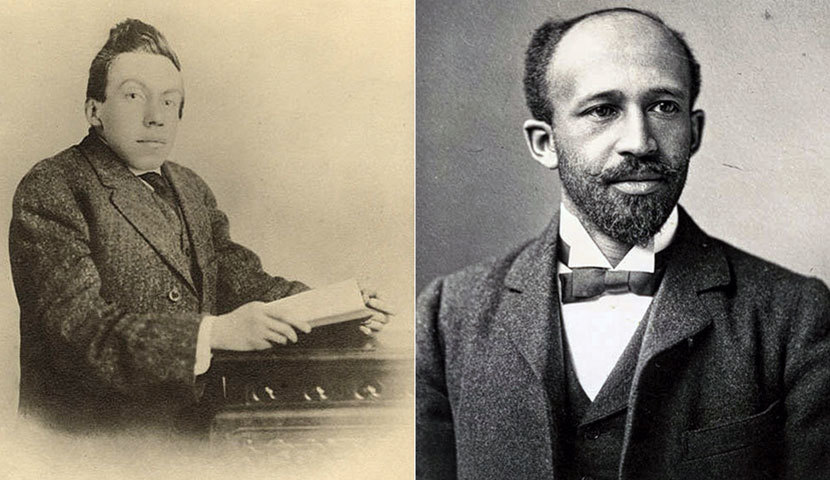
LOA: Which pieces in the book do you think readers will find surprising?
Lemann: Possibly Randolph Bourne’s “Trans-National America,” from 1916, because we imagine that the ideal of a multicultural country would not have appeared that early. Possibly the selections from Andrew Jackson and Theodore Roosevelt, because the idea of a President of the United States attacking big business and banking in such harsh and direct terms seems inconceivable today.
LOA: Do you have a favorite selection in the book?
Lemann: I like the excerpt from W.E.B. Du Bois’s Black Reconstruction for the way it lays out, with brutal candor and efficiency, the structures of white supremacy at a time when that simply wasn’t part of the national conversation even among liberals. I also like Horace Mann’s annual report to the Massachusetts Board of Education for reminding us how difficult a project it was to establish universal public education in the United States.
Library of America will publish Black Reconstruction by W.E.B. Du Bois, in a new edition edited by Eric Foner and Henry Louis Gates, Jr., in the fall of 2021.
